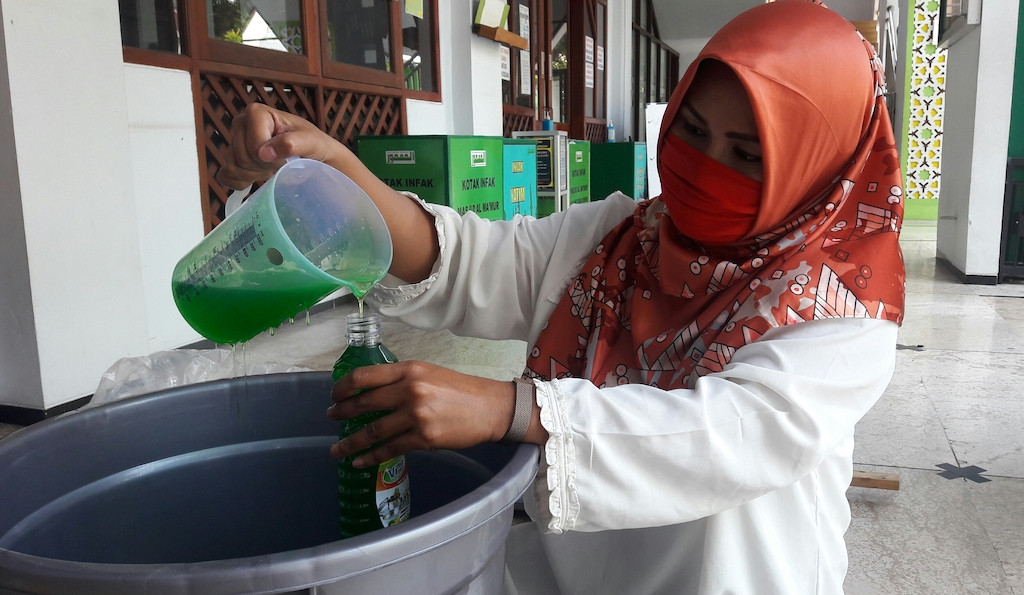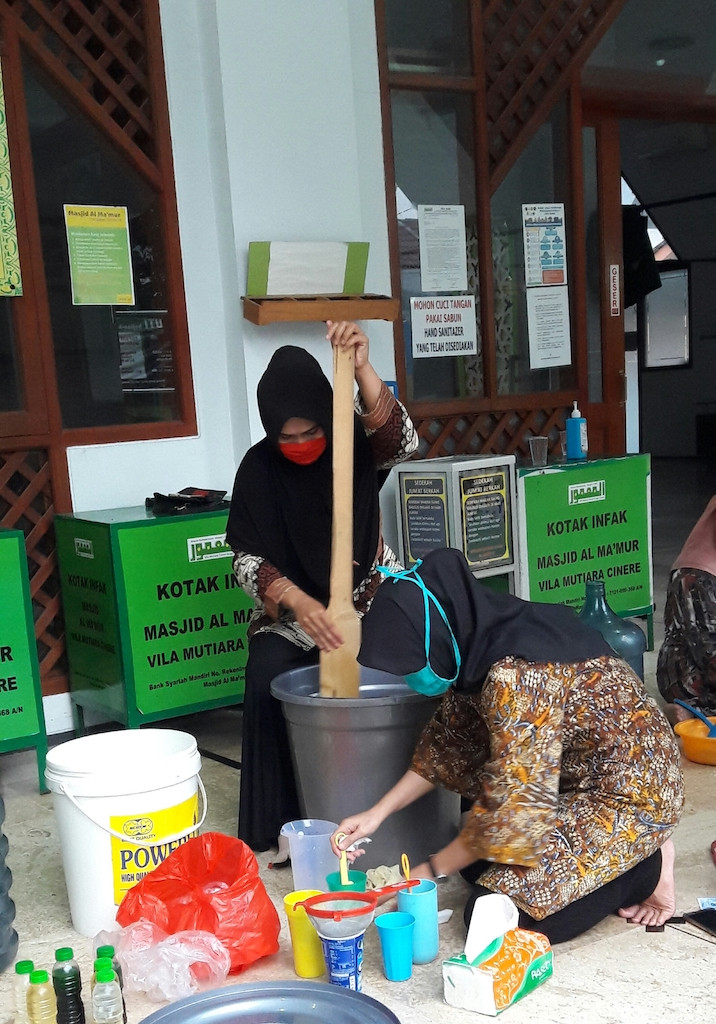Popular Reads
Top Results
Can't find what you're looking for?
View all search resultsPopular Reads
Top Results
Can't find what you're looking for?
View all search resultsOutreach program aims to produce strong breadwinners
Empowering widows has become a global concern with the United Nations calling on nations to take up such initiatives as part of poverty-alleviation and peace-promotion programs. To further bring worldwide attention to this section of the community, in 2011 the UN declared June 23 as International Widows Day.
Change text size
Gift Premium Articles
to Anyone
S
umiati has been increasingly busy in the past six months having gotten involved in a mosque-initiated outreach program making liquid soap.
“Alhamdulillah [Thank God], this work has given me extra income,” she said while preparing the tools and ingredients with three fellow widows on the mosque terrace at a residential complex in Depok, West Java.
She and her partner made hand soap while the other two worked together to make dish soap.
They put all but one ingredient into big plastic buckets and stirred it for up to an hour. After storing the mixture for eight hours, they added the last ingredient the following morning.
“We store it to let the bubbles clear. Only afterward do we put in the perfume as the last ingredient,” Sumiati said.
They then put the liquid into 450-ml capacity plastic bottles, sealed them with caps, applied brand stickers on them and the products were ready for marketing.
Sumiati and her partner made 20 liters of liquid soap, which was converted into 50 bottles, each earning them Rp 1,250 (9 US cents).
The soap is also packaged in 250-ml bottles and 5-liter cans, each earning them Rp 1,000 and Rp 20,000 respectively.
The program participants are entitled to half the revenues, with the other half going to the mosque foundation.
“The foundation initiated the program to help those less well off, including women who have become the sole caregivers for their children because of the loss of their husbands,” Sarjito, a representative of the foundation, said.
“It began when someone offered training in the liquid soap making for free. We accepted and held the training back in January with 10 single mothers participating,” he said.
He said the foundation used the revenues from the program to provide interest-free loans to help the poor.
The outreach members are also encouraged to help sell the products to augment their earnings.
“I market them to neighbors. I have got several customers,” said Fitri Rosani, mother-of-three, whose husband passed away two years ago.
Liquid for livelihood: A member of the women’s empowerment program stirs the mixture as another prepares to put more ingredients into the bucket during the manufacture of liquid soap. (JP/Musthofid)Global issue
Empowering widows has become a global concern with the United Nations calling on nations to take up such initiatives as part of poverty-alleviation and peace-promotion programs.
To further bring worldwide attention to this section of the community, in 2011 the UN declared June 23 as International Widows Day.
The UN has urged societies to ease the hardship that widows endure by providing means of earning a livelihood.
“Death is inevitable, but we can reduce the suffering that widows endure by raising their status and helping them in their hour of need. This will contribute to promoting the full and equal participation of all women in society. And that will bring us closer to ending poverty and promoting peace around the world,” then UN secretary-general Ban Ki-moon said in his speech in 2011.
The death of a husband can leave a woman in severe hardship. Not only must she endure social stigma she is forced to put all the resources she has into rearing her children.
Given her sewing skills, Fitri saw an opportunity to tap into the ongoing coronavirus pandemic by making face masks to sell. She also receives orders for cakes and brokers the purchase of houses.
Sumiati ended up in an even worse situation right after the passing away of her husband more than a decade ago, which forced the family to let go their house and live in a rented property.
Despite these conditions, she still managed to finish her studies at the Open University.
Her eldest daughter has just graduated from a bachelor of agricultural science program at a university.
Her involvement in the liquid soap making adds to her activity list, which includes selling food, giving private classes and offering courier services to help people deal with documents at governmental institutions.
According to 2019 data from Statistics Indonesia (BPS), households with female heads, like those of Sumiati and fellow participants in the outreach program, make up 15.47 percent of 75.8 million households nationwide, as revealed by the Indonesian Women-Headed Households (PEKKA).
Nationwide program
“We chose to use term of female-headed households rather than widows or single parents because this term emphasizes the role of women as heads of families,” Romlah, PEKKA’s director for community counseling, said.
Beginning its empowerment initiatives in 2001, the PEKKA Foundation currently organizes more than 69,000 women in some 1,900 outreach groups in more than 1,000 villages in 20 provinces.
“They share stories, including problems they experience, in order to strengthen and motivate each other,” Romlah said.
Besides forming cooperatives to facilitate savings and loan activity, PEKKA also provides technical training in making organic fertilizers and pesticides, cakes, herbs, coconut oil, salted eggs and soap.
“The group in East Nusa Tenggara makes coconut oil and sells it to the surrounding community. They are now trying to make soap from coconut oil,” Romlah said.
The outreach program aims to make women tough breadwinners with access to economic resources and advocacy.
“We facilitate them in planning their future,” she said.











